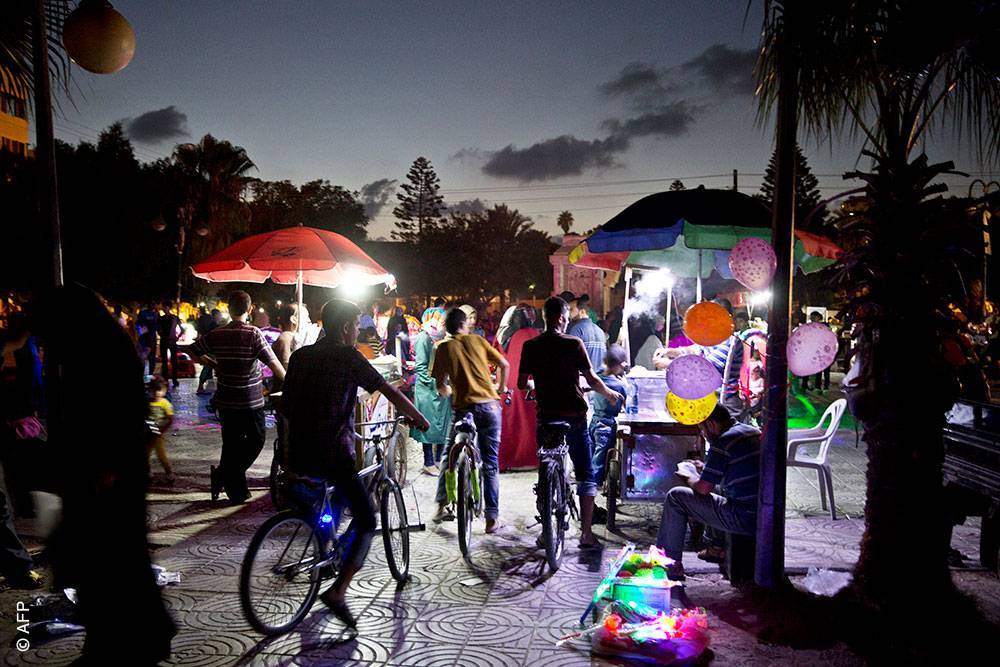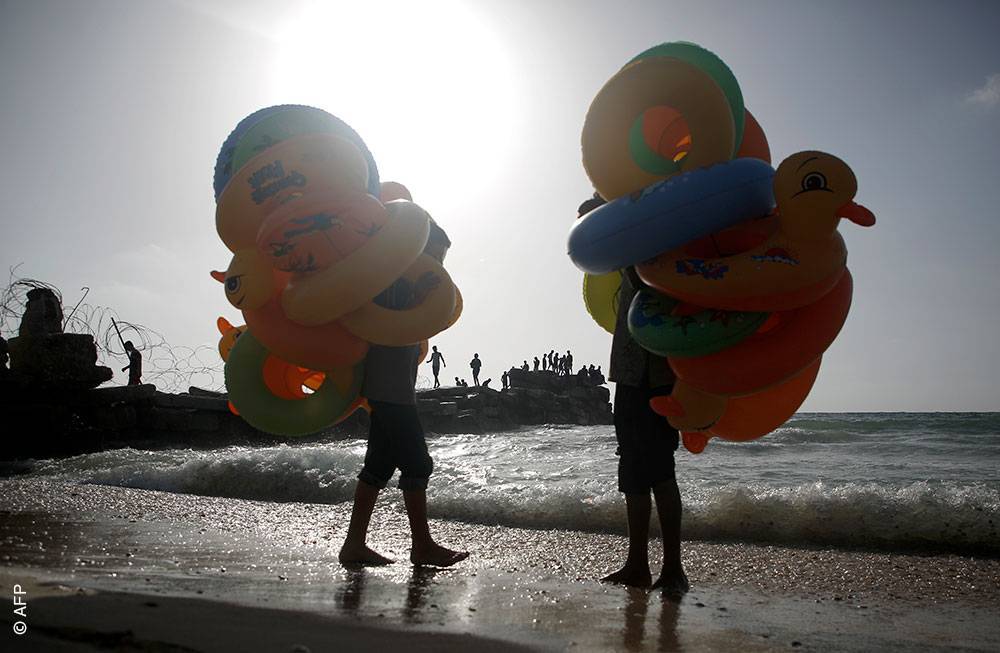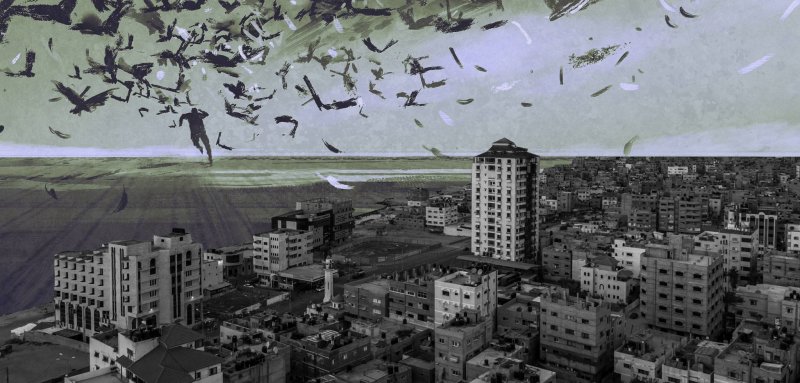You cannot live in the Gaza Strip community without forcing yourself into a state of fear. It is as mandatory as the need for air and water, in order to prevent being subjected to any physical or mental harm.
This situation applies to public servants and private sector employees alike, university students, teenagers, as well as children from poor and low-income families that routinely receive aid from humanitarian or state institutions.
The constant fear of the outbreak of an Israeli war dominates daily life for Palestinians.
Fear Of Israel
Iman Mana’imah, 70, refuses to criticize the Israeli occupation in front of the cameras of some journalists requesting interviews with her about life in Gaza camps and the occupation. She fears losing the ability to be treated in Israeli hospitals and the West Bank.
One of her friends, in the Al-Shati Camp (aka the Beach Camp) west of Gaza City, was denied security clearance to reach a hospital in Ramallah for speaking with media against the Israeli army despite her friend’s warnings.
Gaza residents’ fear does not stop at Israelis’ refusal to grant them passes into their own land for emergencies and medical care. The foremost fear continues to be the possibility of a war waged on them. This fear cannot be forgotten by the Gazans even if they try, since the noise of ever-present Israeli reconnaissance drones flying over the besieged strip reminds them of it at every chance.
Apart from Israel, other fears remain present in the hearts of Gazans, such as the constant worry over losing their livelihoods and the aid they may be receiving, aside from the suppression of their freedoms and liberties.
Fear Over Incomes
The wave of fear in Gaza began with the Palestinian division in 2007, especially with the rise of the suppression of liberties committed by security apparatus controlled by Hamas in order to impose its authority and other political purposes. Fear entered its way into the minds and hearts of civil servants working for the Palestinian authority who pray in mosques located in areas under Hamas’s control.
The income of a number of Palestinian authority employees was severed due to their contact with Hamas members during prayer in mosques, most of which fall under the jurisdiction of the organization. In consequence, the first real spark of fear formed within 65 thousand Gazan personnel in the Palestinian authority, who are considered the main driving force behind the local economic engine in Gaza.
Some were able to convince a number of authority figures in the West Bank that they were not affiliated with Hamas, and in turn, their income was returned to them. However, others joined the movement and were appointed into positions within the Hamas government.
Gaza residents’ fear does not stop at Israelis’ refusal to grant them passes into their own land for emergencies and medical care. The foremost fear continues to be the possibility of a war waged on them
The fear phenomenon of salary cuts has become a reality. It could occur when an employee opposes Palestinian authority institutions or supports the Democratic Reformist Current (DRC), an organization headed by Mohammed Dahlan, rival of Palestinian President Mahmoud Abbas.
Employees within the Hamas government run the risk of drawing the attention or punishment of the movement if they criticize it; something that has occurred to some who haven’t received their full salaries over the past 5 years.
Jamal al-Najjar, 43, is among those who the authority had their salaries cut in February 2019. The reason was due to receiving aid from a humanitarian agency backed by Dahlan. According to him, he currently lives in a state of extreme poverty, supporting a son with physical and motor disabilities. He uses most of his salary to pay off bank loans he had acquired years ago to build a modest house in the Jabalia Camp north of the Gaza Strip, with only 100 dollars remaining to cover living expenses.
The Palestinian authority had earlier cut the pay of Jamal’s brother Ziyad, 38, following the Palestinian division, and his pay was returned to him a year later. However, it was cut again during the beginning of the past year due to suspicions that he supports Dahlan and takes part in events held under the DRC in Fatah.
Jamal Najjar says, “The parties in Gaza have left us divided in fear of a malicious report targeted against one of us, or of becoming classified into rival political groups.” He adds, “I hate politicians. I didn’t reject humanitarian aid because I really am in need and currently live in great poverty. But the sad reality is that now even humanitarian aid has become politicized, and many like me have fallen victim to political disputes.”
The Palestinian Centre for Human Rights has stated in February 2019 that the Palestinian authority has cut the salaries of more than 5 thousand civil servants ad military personnel in Gaza under the pretext of their support and affiliation to the reformist party in Fatah and Hamas as well as the Islamic Jihad Movement. These latest cuts join tens of thousands of others who lost their income following the division in 2007 and the years that followed.
During the beginning of November of last year, a member of the Gaza police force criticized Hamas for their lack of seriousness in protecting the rights of employees in Gaza following the 5th consecutive year in which they haven’t gotten paid their full salaries. He spoke to Raseef22, asking to remain anonymous and recounted how they are suffering under heavy burdens of loans and debt, but are still asked to carry out their work duties regularly.
The next morning, he was subjected to an investigation committee under the guise of underperforming on the job and was forced to submit a pledge to never write any posts or else he would subject himself to legal liabilities.
He says, “Yes we live in a miasma of fear. The strong is the one who instills dread and fear in Gaza. I don’t hide that I belong only to the Hamas resistance, not the Hamas government. I feel heartbroken that I have to live monitoring myself and what I say so I don’t jeopardize my job.”
Fear Of Aid Cuts
On the streets of Gaza, no one hides their fear. A 36 year old candy vendor working the Omar Mukhtar Street, the Gaza Strip’s most famous street, spoke to Raseef22 but requested we didn’t reveal his family name, in fear of losing his “social welfare check”, which is an amount of money allocated by the ministry of social development for poor and underprivileged families in the strip.

The vendor deems that revealing his name in the media would unveil that he has a source of living, and an employee from the Social Development Ministry could find out and cut off his allocated check.
He is not the only one living under such circumstances. Not far from him, in the ‘Square of the Unknown Soldier’ in the middle of the Gaza Strip is another vendor that doesn’t want to reveal his real name for the same reasons. The hot drinks seller asked to be referred to as the “oppressed citizen”.
The ‘oppressed citizen’ tells Raseef22, “In the square we find beggars, students, employees, unemployed youths, as well as young ladies that cannot afford the cost of transportation, among others. Everyone is afraid of losing their livelihoods. The authority employee is afraid of having his salary cut, and the Hamas employee also fears for his job, and I am afraid of losing my social welfare check, while others fear the cutting of their aid. The brave does not live in this country. Whoever wants to be brave must leave.”
The strong is the one who instills dread and fear in Gaza. I don’t hide that I belong only to the Hamas resistance, not the Hamas government. I feel heartbroken that I have to live monitoring myself and what I say so I don’t jeopardize my job.
A quarter of a million Gazans live off periodic cash transfer programs from the Social Development Ministry, according to the ministry’s undersecretary Yousef Ibrahim. The ministry provides the financial aid to every family every three months.
Aside from that, there are other programs such as the non-periodic aid program, the food security program, as well as the underprivileged families’ program. The number of those who benefit from ministry aid programs reaches up to half a million Gazans.
In addition, more than one million Gaza residents depend on humanitarian aid organizations in a strip that holds over two million inhabitants.
Fear Culture
Psychiatrist and neurologist Dr. Fadel Ashour sees that the state of fear that accompanies people in Gaza contains a major contradiction. He says they are afraid of the status quo changing, but they are also afraid of it staying the same. Everyone knows that the current situation, in which Gaza is more controlled by Hamas than the Palestinian authority, can only be changed through a violent and drastic process that will end in bloodshed. He goes on to say that this is the change that Gazans are afraid of, concluding with the statement that Gaza has become a “state of fear”.
The main reason of the dominance of this state of fear is due to the establishment of social and financial interest rules by Palestinian parties with the public. This means that the livelihoods of numerous families are connected to the activity of existing political parties, so there is a fear of losing these livelihoods, even if the parties censor and oppress the opinions of Gaza residents.
Ashour reveals that he has noticed all this through the examination of many psychiatric cases, while also observing the general state of the public. He reaffirms that the most dangerous type of fear is fearing the deprivation of one’s source of living.
Ashour sees that fear has become a phenomenon passed on among the Palestinian people since the Nakba in 1948, since they are living a constant state of anxiety and insecurity over what’s to come, all under the shadow of the Israeli occupation. All generations came following the Nakba inherited “the feeling of fear”, apart from a short period where hope prevailed following the signing of the Oslo peace treaty in 1993.
Neurologist Dr. Ashour: People in Gaza are afraid of the status quo changing, but they are also afraid of it staying the same, concluding that Gaza has become a State of Fear. The brave do not live in this country, whoever wants to be brave must leave.
He says, “Fear within a community from some components within that same community is something that has not existed before. We do not differ from most Arab societies, but the fear in the Gaza Strip is considered the highest amongst all world societies. There is even a fear that comes from any positive thing happening to a Gaza resident, because the Gazan mind is wired to think that any type of change comes with danger. Gaza’s society is now heading towards more anxiety, resulting in more hostilities and extremism.”

Due to this reality, people are faced with two choices, according to Ashour, “either fighting despair or just giving in”. He goes on to mention that in 2006 people were more oriented towards religious ideologies, but now it isn’t the case, especially when it comes to youth who are rebelling against them.
He ends with the statement that Gaza’s society contains all types of psychological disorders, most of which are general anxiety, and there are people who have turned to drugs and addiction as a means to escape this prevailing anxiety.
Black Comedy Amongst The Youth
Many youths in Gaza have started to express their opinions via their only remaining outlet - social media sites - through means that bypass the Gazan reality and its governing policies. Accompanying these posts are suggestively cynical terminology that are used to avoid harm or prosecution.
Civic researcher and activist Hassan Jammal has faced security summons and investigations after spearheading campaigns against Israeli falsifications of the Palestinian narrative internationally and against some internal human rights violations in Gaza. Jammal believes that this current reality has forced the youth to become afraid of freely expressing themselves and also afraid of a vague future amidst a nihilistic view of their lives.
Jammal describes living in the Gaza Strip in the past decade as some type of affliction no one would wish for, saying, “The grim reality and bleak horizon are reinforcing fear within the young mind and are creating what could be called a fear continuum, which is a cocktail of fears produced by an abnormal social and political reality; fear of not being able to acquire a university education, a job, or an immigration, or even criticizing a ruling power that could deprive you of travel or employment.”
Jammal believes in dark humor as a higher form of criticism. He sees that they are less costly than direct criticism, and such camouflage is used due to the presence of varying concerns regarding a possible authority crackdown in Gaza.
He uses the country name of Mozambique in his posts instead when he criticizes local authorities. He deems it a “punching bag” to unleash all his critiquing blows, even though he has been detained a number of times.
Raseef22 is a not for profit entity. Our focus is on quality journalism. Every contribution to the NasRaseef membership goes directly towards journalism production. We stand independent, not accepting corporate sponsorships, sponsored content or political funding.
Support our mission to keep Raseef22 available to all readers by clicking here!
Interested in writing with us? Check our pitch process here!



